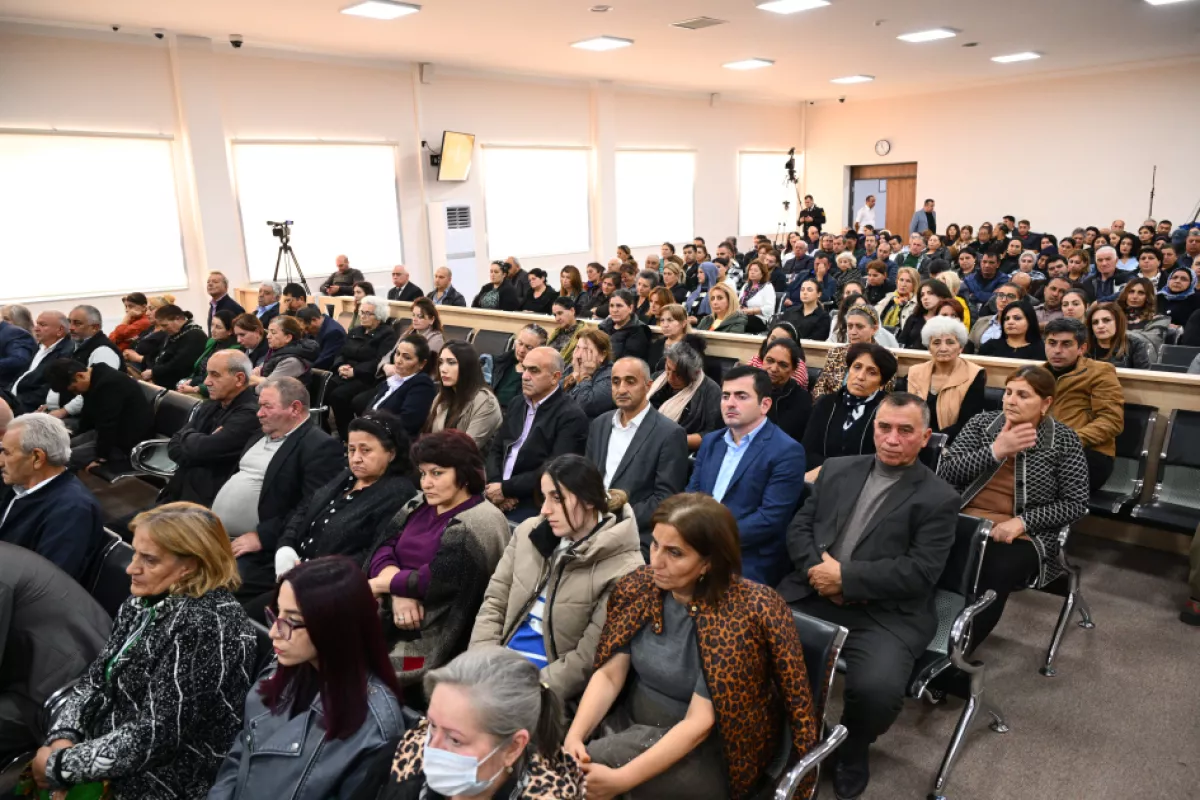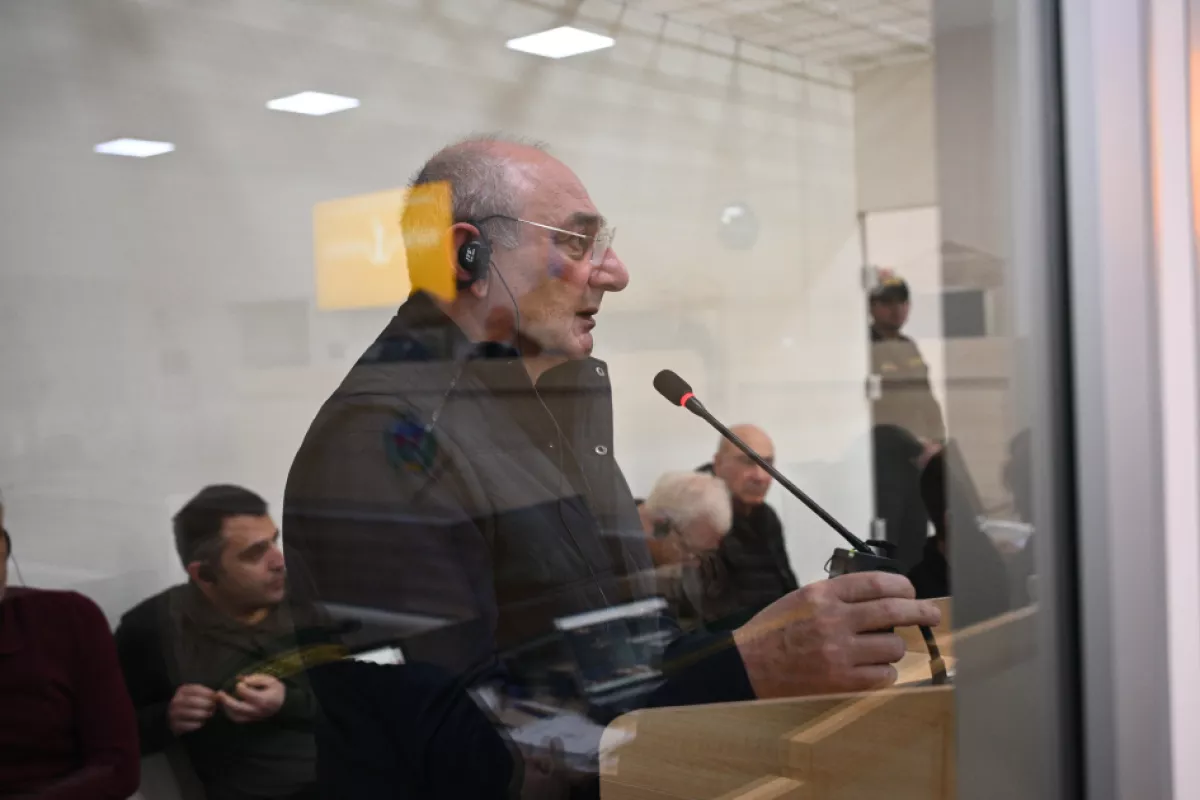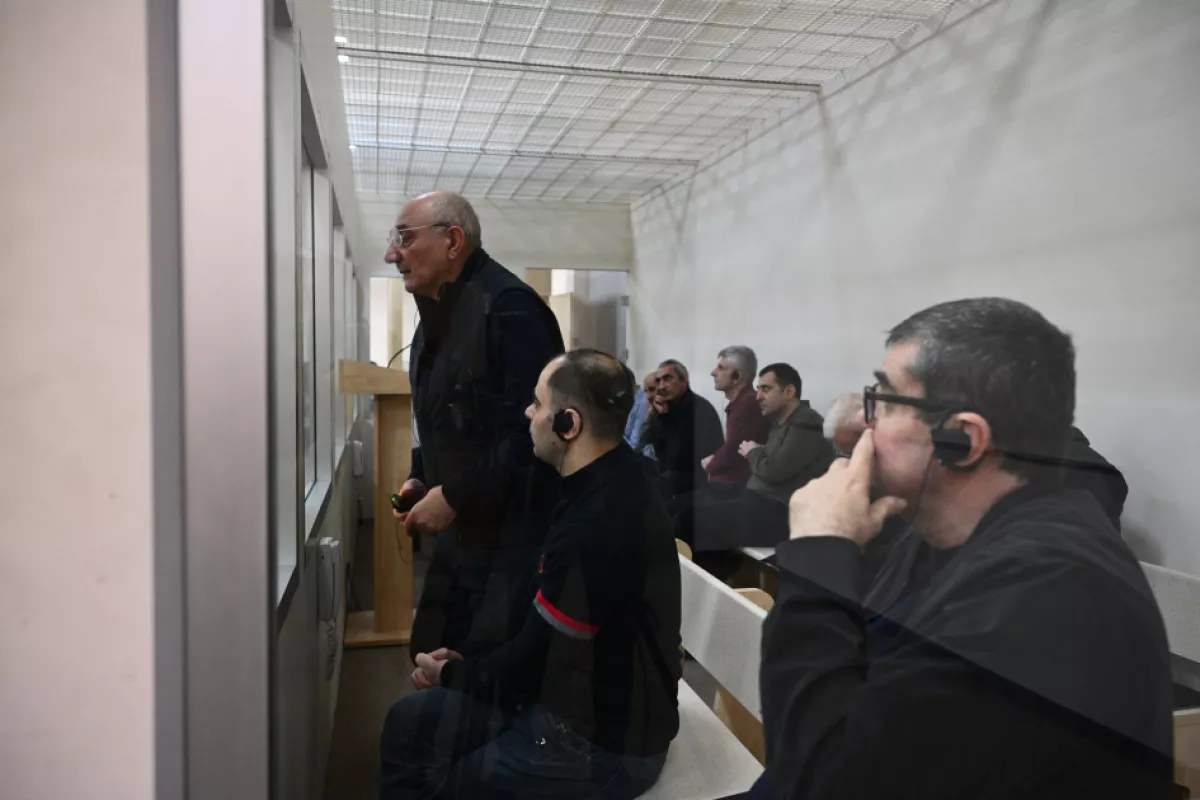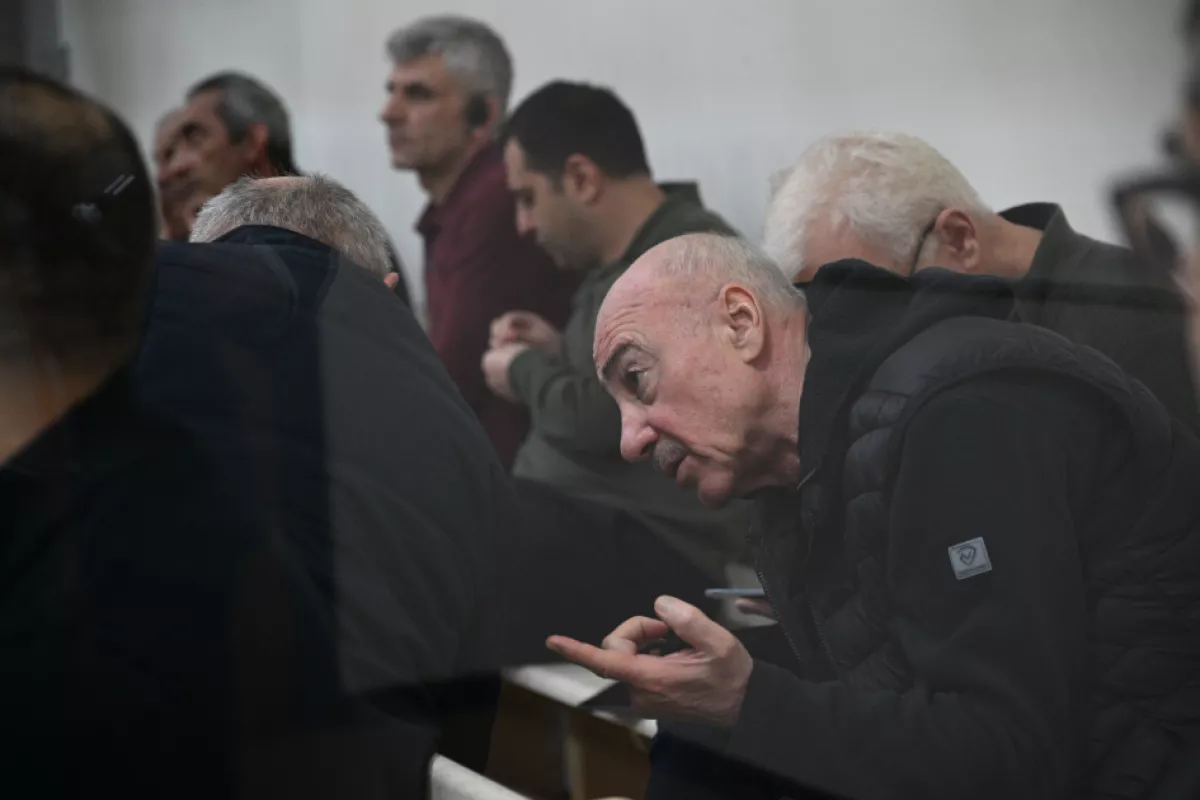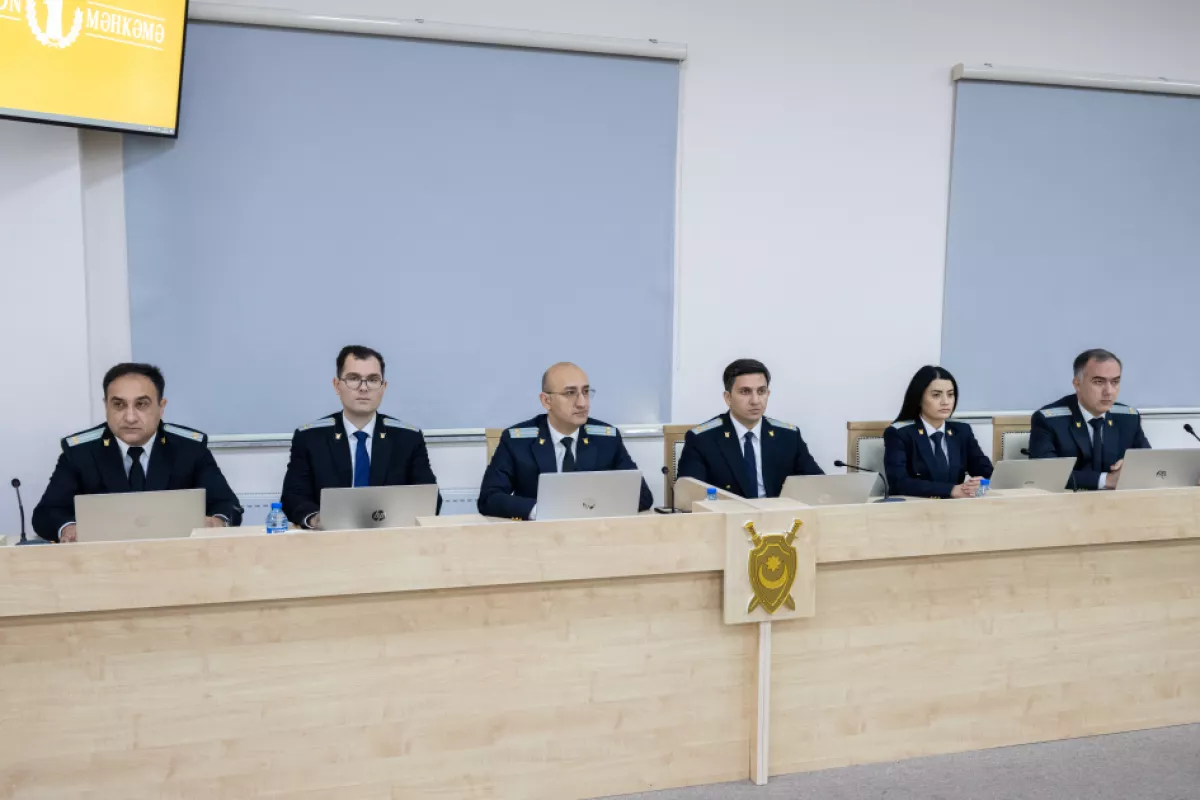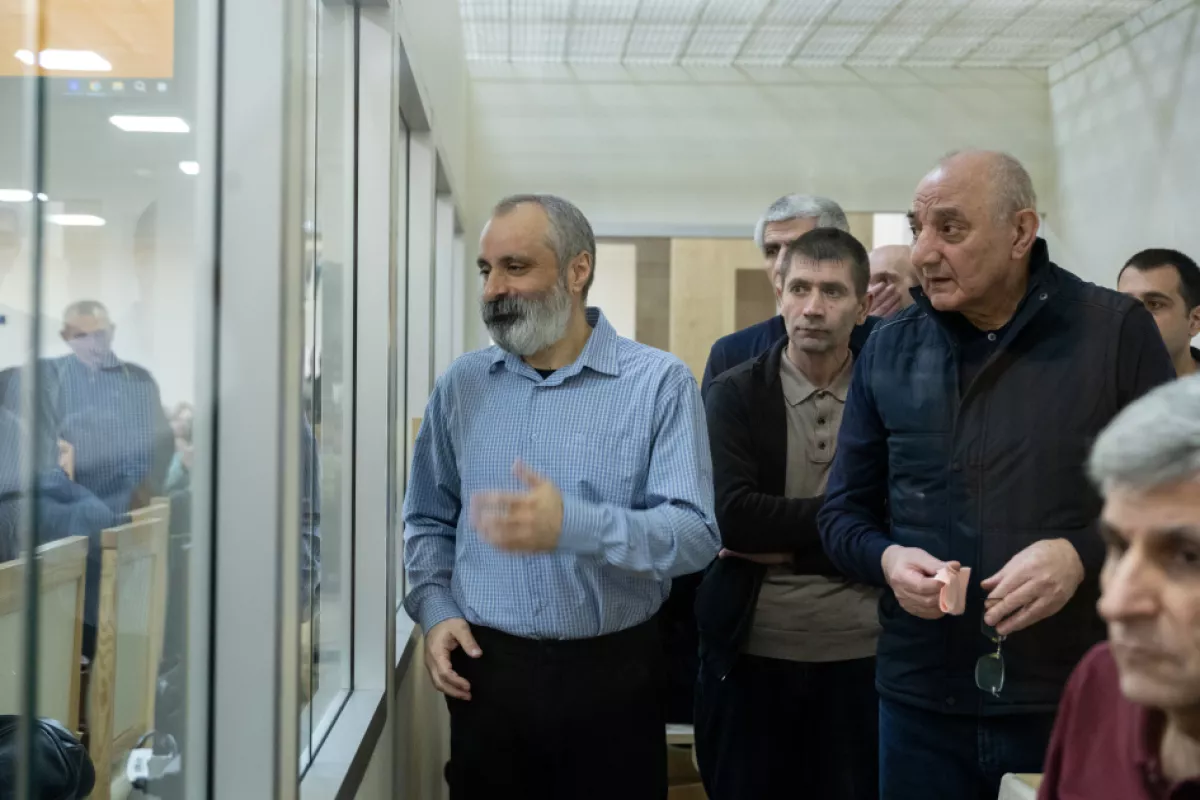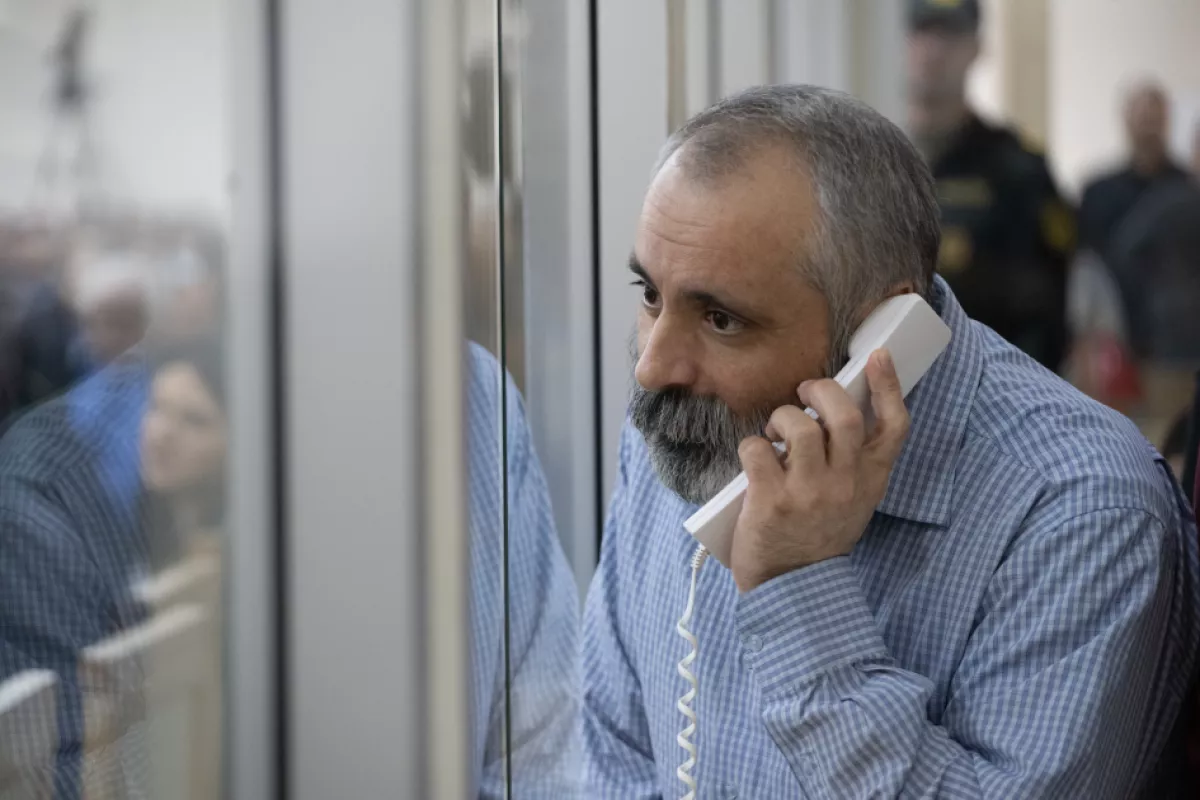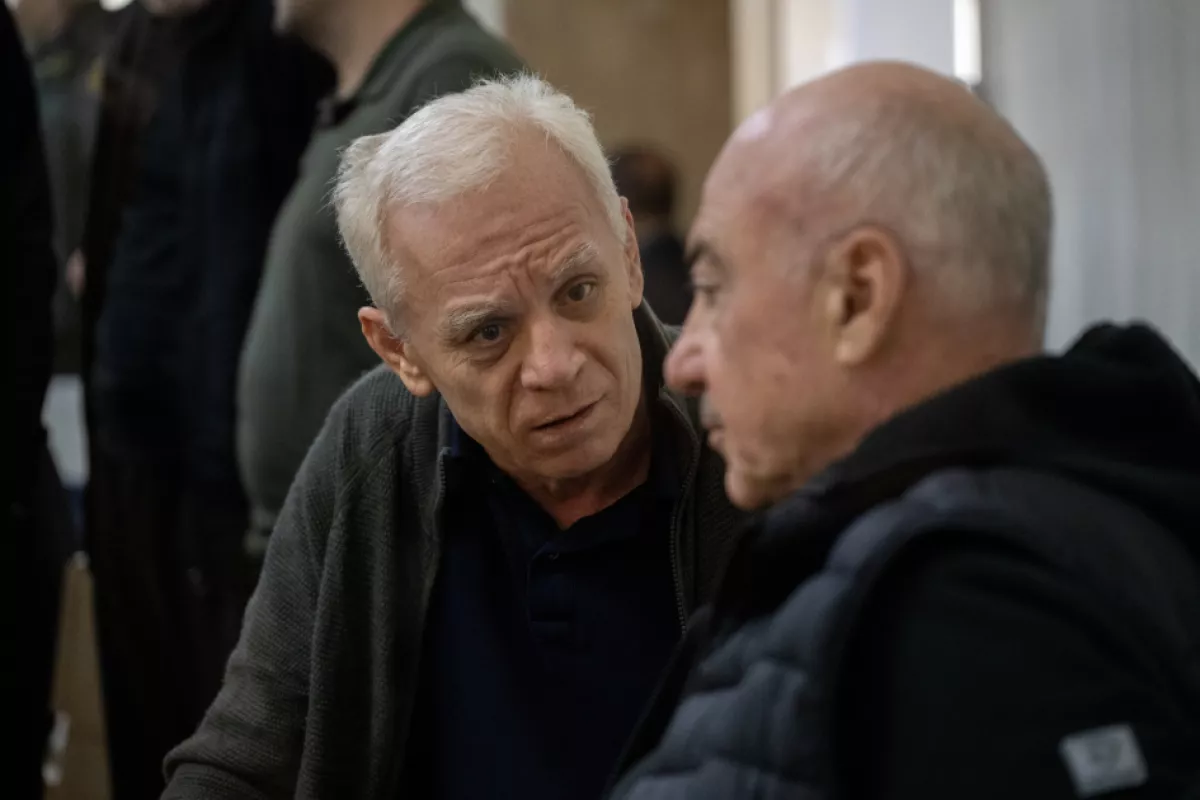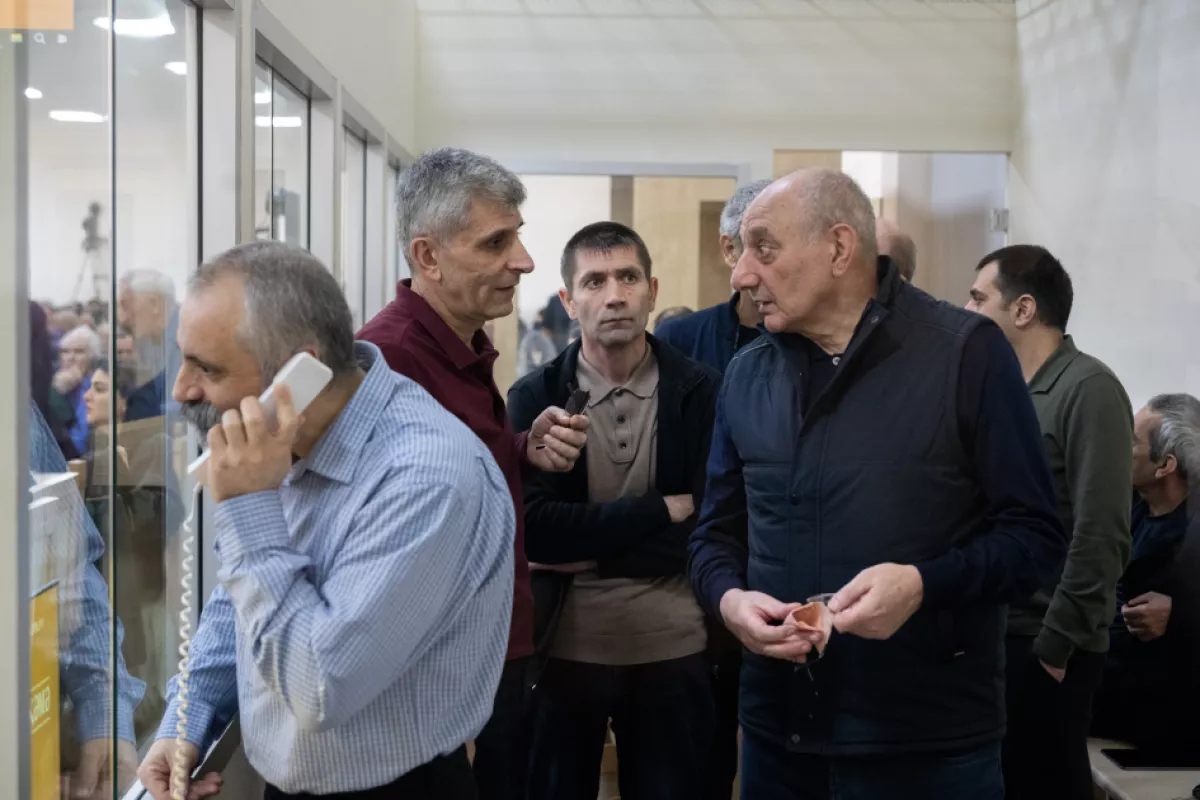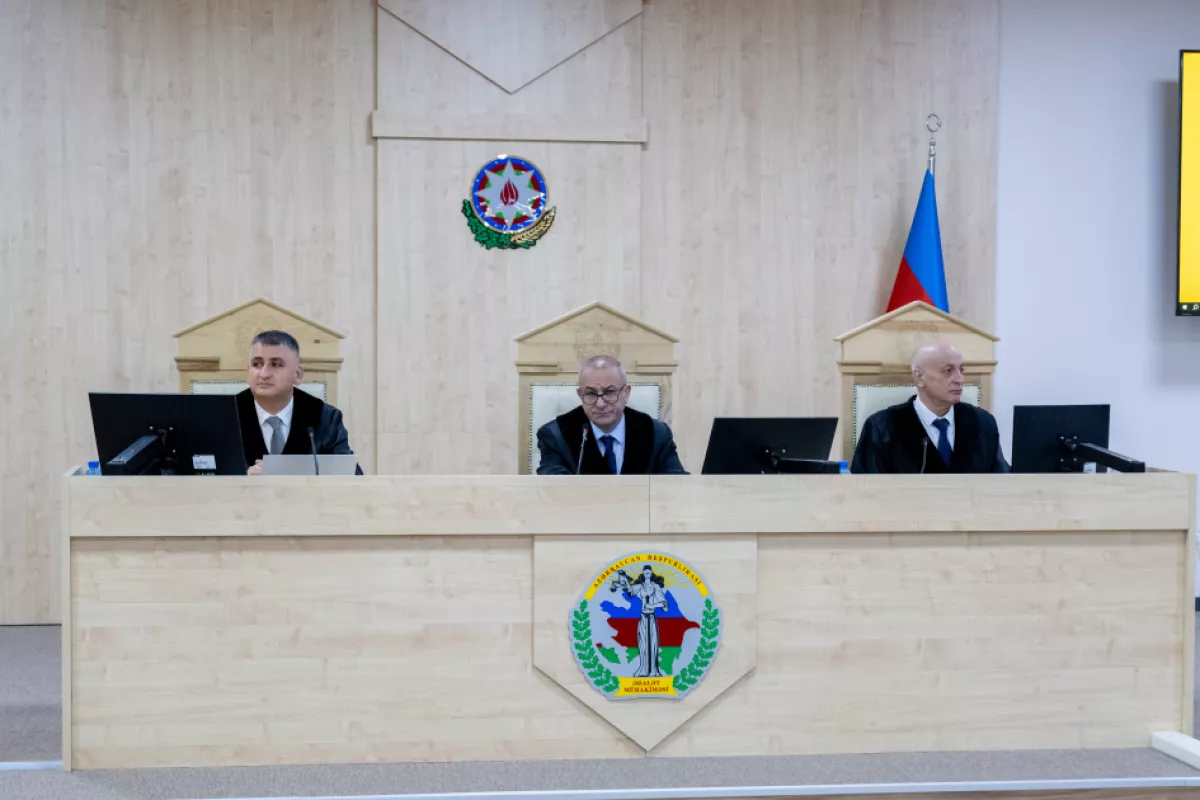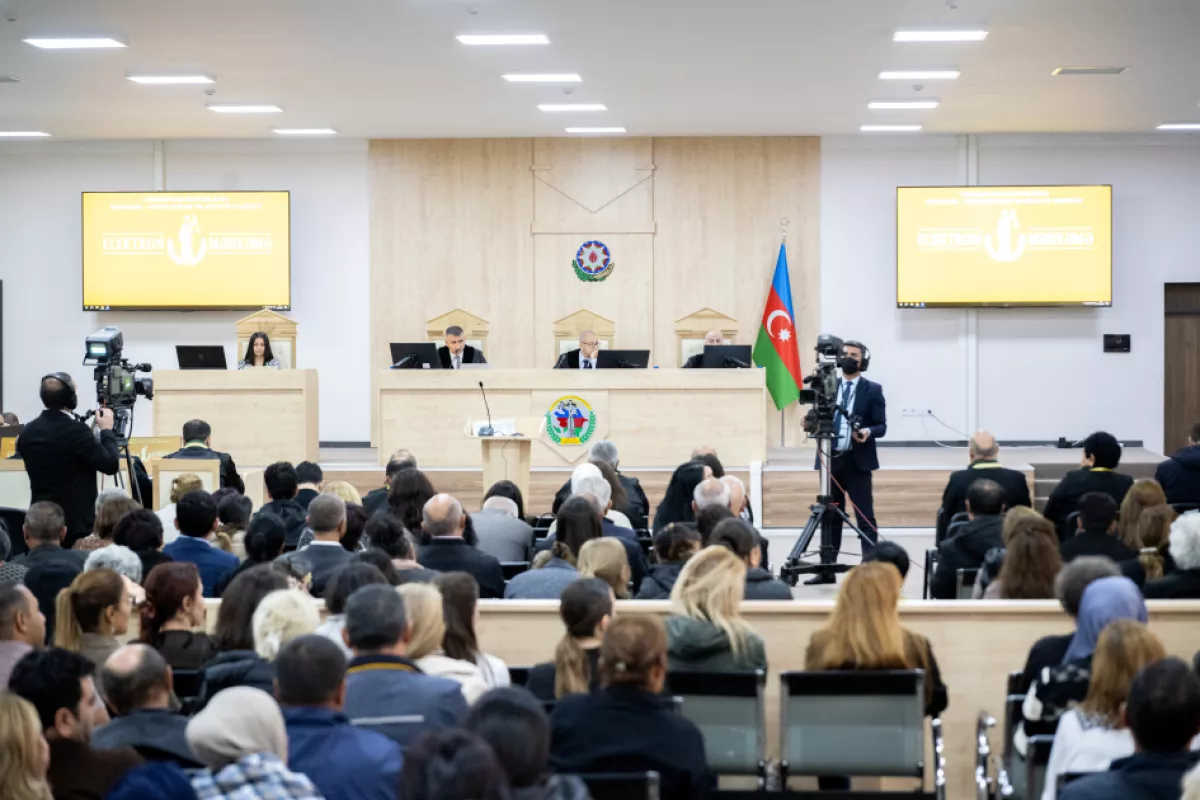Baku trial: Arayik Harutyunyan evades question on Armenia’s claim to Karabakh PHOTO
The open court session on the criminal cases against citizens of the Republic of Armenia — accused of crimes against peace and humanity, war crimes, including the preparation and conduct of aggressive war, genocide, violation of the laws and customs of war, as well as terrorism, financing of terrorism, forcible seizure of power, forcible retention of power, and numerous other crimes resulting from Armenia's military aggression against Azerbaijan — Arayik Harutyunyan, Arkadi Ghukasyan, Bako Sahakyan, Davit Ishkhanyan, David Babayan, Levon Mnatsakanyan, and others, continued on October 27.
The court session, held at the Baku Military Court under the chairmanship of Judge Zeynal Aghayev and the panel consisting of Jamal Ramazanov and Anar Rzayev (reserve judge Gunel Samadova), ensured that each accused person was provided with an interpreter in their native language, as well as lawyers for their defense, Caliber.Az reports via AZERTAC.
The session was attended by the accused individuals, their defenders, a portion of the victims, their legal heirs and representatives, as well as prosecutors representing the state prosecution.
During the court session, the statements of the victims and the legal heirs of the victims were announced.
Victim Seyidov Nadir Badir oglu, a driver at the 1st Road-Transport Department of the "Azeravtoyol" Open Joint-Stock Company, stated in his testimony that the excavator he was operating hit a mine planted by the enemy in the territory of Zangilan district on November 19, 2021. As a result of the explosion, he and Renad Aghababayev, who was with him, were injured.
Based on the announced statement of victim Zeynalov Baykishi Musa oglu, on September 27, 2020, a shell fired by Armenian armed forces hit his home in Garadaghli village of Aghdam, causing him to sustain various bodily injuries, and his house, along with its furnishings, became unusable.
Based on the announced statements, victim Hasanov Mehman Fikrat oglu was injured by a shell fired by the enemy in the territory of Mollalar village of Aghdam district on September 19, 2023; victim Guliyev Huseyn Mahir oglu was injured by the explosion of a shell fired in the territory of Janyatag village of Aghdara district on the same date; and Hasanli Imran Elman oglu sustained bodily injuries as a result of fire opened toward Aghdara district on September 20 of the same year.
According to other announced statements, the legal heir of victim Farzaliyev Samir Vagif oglu, Farzaliyeva Siyafer Ali gizi, reported that her son was killed on September 27, 2020; while the legal heir of victim Ismayilov Mirrahim Mirmehdi oglu, Ismayilov Mirmehdi Ismayil oglu, stated that his son was killed on October 2 of the same year, in the direction of Sugovushan village of Tartar district.
In the statement of victim Tevon Taghiyev, it is noted that during the attack by Armenian armed forces on Garadaghli village of Khojavend district where he lived on February 16, 1992, he, other village residents, and soldiers were taken captive and hostage. Armenian armed forces took them toward Khankendi. He recognized Kamon, Samvel, and Abo among the Armenian soldiers. On the way, Armenian armed forces killed Shahmurad Huseynov, Habib Huseynov, and Zahid Khalilov. After being held in Khankendi, Vartan Balayan brought him and 12 others to Khojavend. They were held in Khojavend until the day of the exchange. While in Khojavend, Armenian armed forces subjected them to torture. His son Telman Taghiyev was killed by Armenian armed forces in Garadaghli village, and he was unable to retrieve his body.
In the statement of Ilyasov Babek Hasan oglu, it was emphasized that on March 31, 1993, in the "Tunnel" area of Kalbajar district, he was taken captive by soldiers of the Armenian army and held in Khankendi City Children's Hospital. He was then released from captivity on June 13 of the same year. Although he was wounded in his right eye when taken captive, no medical assistance was provided to him. As a result, he completely lost vision in one eye. At that time, his grandfather Aslan Mirzayev and mother Afet Mirzayeva were brutally murdered.
Victim Bayramov Faik Selim oglu stated in his testimony that on June 16, 1993, near a lake located in the vicinity of Yetim Jinli village of Aghdam district, he was taken captive along with 12 others by Armenian soldiers. They were held for one week in Aghdam district and then in a prison in Shusha city, where they were subjected to severe torture. Armenian armed forces beat him severely with fists and kicks, broke his nose and teeth with wooden pieces, and kept him hungry and thirsty.
In the announced statement of Ismayilov Asif Sakit oglu, he noted that on April 19, 1994, he was taken captive in the direction of Ilkhichilar village of Aghdam. Armenian armed forces placed him, in a wounded condition, on top of a tank and took him in an unknown direction. Since the top of the tank was stained with blood flowing from his body, they beat and tortured him. In addition, Armenian armed forces broke his nose by striking him with the butt of a weapon. They took him and the other captives to Shusha prison and held them in cold, dark cells from late 1994 to early 1995. There, Armenian guards brutally beat and tortured him and the other captives. He remembers the names of some of those guards: Artur, Manvel, Samvel, Vanyan, and Zhirik.
Victim Aliyev Shovgi Khagani oglu stated in his testimony that during the attack by Armenian armed forces on Aghdam district, his brother Nijat Aliyev and grandfather Oktay Aliyev were killed; he himself, his father Khagani Aliyev, mother Konul Aliyeva, and grandmother Zenife Aliyeva were taken captive and hostage in a wounded condition. After being taken captive, instead of being treated by Armenian doctors at Khankendi City Children's Hospital, his shoulder bone was extracted along with muscle tissue for transplantation purposes, resulting in permanent disability.
In his statement, Hajiyev Elman Gahraman oglu emphasized that on September 25, 1993, near Murov mountain, he was taken captive by soldiers of the Armenian armed forces and brutally beaten. He was then transported by truck to Yanshag village of Kalbajar and interrogated in a military unit located there. Because they did not accept his answers to the questions, they beat him until he lost consciousness. After staying in that military unit for a while, he was taken to Aghdara district and thrown into the basement of a house belonging to an Armenian named Yasha. While held there, he was subjected to severe torture. In approximately April 1994, he was taken to Shusha prison along with several other Azerbaijani captives. There, he was regularly and brutally beaten. In approximately July 1994, he was brought to Khankendi city along with several other Azerbaijani captives whose names he could not recall. He remained there until approximately October 1994. Then, he was taken to Aghbulag village of Khojavend district and held until approximately December 1995 in a house belonging to an unknown Armenian, with his hands and feet tied. In late 1995, he was taken to Shusha prison, and in mid-March 1996, to a special-regime isolation facility in Khankendi city. During this period, in Aghbulag village, along with Azerbaijani captives whose names he could not recall, he was forced to perform construction work for Samvel Babayan and his brother Karo Babayan. While there, individuals named Lyova, Ludvik (also called Lyoşa), Mayis, Andrey, Karen, Vova, and Garik regularly and brutally beat him.
Karimov Tabriz Ajdar oglu, Safarli Vusal Mirzali oglu, and others stated in their testimonies that they were injured during the Tovuz battles in July 2020, in which Azerbaijan's National Heroes—Major General Polad Hashimov and Colonel Ilgar Mirzayev—were also killed.
Following this, the evidence presented by the defense side was examined in court.
For instance, several of the examined documents were submitted by the lawyers defending the rights of the accused Arayik Harutyunyan—Javid Rzazade and Anar Mammadov. The documents included copies of Arayik Harutyunyan's birth certificate, Republic of Armenia passport, and an inquiry regarding his education.
Additionally, based on the petition of Harutyunyan's defenders, the protocol of the investigative experiment contained in the criminal case materials and an article published on AZERTAC's official website were announced.
The inquiry indicates that Arayik Harutyunyan was admitted in 1990 to the daytime department of the Planned Economy Faculty of the Yerevan People's Economy Institute, now the Armenian State University of Economics. In 1993, he was released from that institute in connection with his transfer to the "University" in Khankendi.
Regarding the examined copy of Arayik Harutyunyan's passport in court, when responding to his defender's question, the accused stated that passports with the code "070" were issued to residents of the so-called "Nagorno-Karabakh regime" territory. The difference between these passports and those issued to citizens of the Republic of Armenia was that individuals holding passports with the specified code could not participate in elections held in Armenia, including voting. Nevertheless, holders of passports with the code "070" had the right to travel abroad as Armenian citizens for tourism, education, healthcare, and other purposes.
In response to the question from state prosecutor Vusal Abdullayev—"Doesn't the indication of his birthplace as Khankendi city of the Azerbaijan SSR on the birth certificate and the Armenian SSR on the passport mean that Armenia considers Karabakh its own territory?"—the accused evaded answering and stated that he had never discussed this issue with Armenia's affiliation authorities, nor had it ever been a topic of discussion.
Reminding that the accused Arayik Harutyunyan is not an ordinary person, the state prosecutor noted that he did not provide a specific answer to the substance of the question and added: "If you do not wish to answer, that is your right."
The court proceedings will continue on October 30.
Fifteen defendants of Armenian origin are accused in the criminal case concerning numerous crimes committed during the aggressive war waged by the Armenian state - including the aforementioned criminal association - on the territory of Azerbaijan, in violation of domestic and international legal norms. These crimes were committed for the purpose of military aggression against Azerbaijan and were carried out under the direct leadership and participation of the Armenian state, officials of its state institutions, its armed forces, and illegal armed formations, through their written and verbal orders, instructions, and guidelines; material, technical, and personnel support; centralized management; as well as under strict control and under the leadership and direct or indirect participation of Robert Sedraki Kocharyan, Serzh Azati Sargsyan, Vazgen Mikaeli Manukyan, Vazgen Zaveni Sargsyan, Samvel Andraniki Babayan, Vitali Mikaeli Balasanyan, Zori Hayki Balayan, Seyran Musheghi Ohanyan, Arshavir Surenovich Garamyan, Monte Charles Melkonyan, and others.
The following individuals - Arayik Vladimiri Harutyunyan, Arkadi Arshaviri Ghukasyan, Bako Sahaki Sahakyan, Davit Rubeni Ishkhanyan, David Azatini Manukyan, Davit Klimi Babayan, Levon Henrikovich Mnatsakanyan, Vasili Ivani Beglaryan, Erik Roberti Ghazaryan, Davit Nelsoni Allahverdiyan, Gurgen Homeri Stepanyan, Levon Romiki Balayan, Madat Arakelovich Babayan, Garik Grigori Martirosyan, and Melikset Vladimiri Pashayan - are being charged under the following articles of the Criminal Code of the Republic of Azerbaijan: Article 100 (planning, preparing, initiating, and waging a war of aggression); Article 102 (attacking persons or organizations enjoying international protection); Article 103 (genocide); Article 105 (extermination of the population); Article 106 (enslavement); Article 107 (deportation or forced displacement of population); Article 109 (persecution); Article 110 (enforced disappearance of persons); Article 112 (deprivation of liberty contrary to international law); Article 113 (torture); Article 114 (mercenary service); Article 115 (violation of the laws and customs of warfare); Article 116 (violation of international humanitarian law during armed conflict); Article 118 (military robbery); Article 120 (intentional murder); Article 192 (illegal entrepreneurship); Article 214 (terrorism); Article 214-1 (financing terrorism); Article 218 (creation of a criminal organization); Article 228 (illegal acquisition, transfer, sale, storage, transportation, and possession of weapons, ammunition, explosives, and devices); Article 270-1 (acts threatening aviation security); Article 277 (assassination of a state official or public figure); Article 278 (forcible seizure and retention of power, forcible change of the constitutional structure of the state); Article 279 (creation of armed groups not provided for by law); and additional articles.




